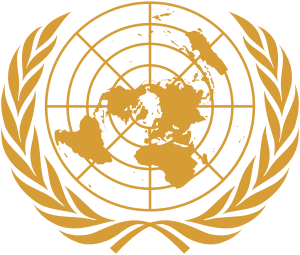United Nations Human Settlements Programme
| United Nations Human Settlements Programme | |
 | |
| Abbreviation | UN-Habitat |
|---|---|
| Formation | 1978 |
| Type | Programme[1] |
| Legal status | Active |
| Headquarters | Nairobi, Kenya |
Head |
Executive Director of UN-Habitat Joan Clos[2] |
Parent organization | United Nations |
| Website | http://www.unhabitat.org |
The United Nations Human Settlements Programme (UN–Habitat) is the United Nations agency for human settlements and sustainable urban development. It was established in 1978 as an outcome of the First UN Conference on Human Settlements and Sustainable Urban Development (Habitat I) held in Vancouver, Canada in 1976. UN-Habitat maintains its headquarters at the United Nations Office at Nairobi, Kenya. It is mandated by the United Nations General Assembly to promote socially and environmentally sustainable towns and cities with the goal of providing adequate shelter for all. It is a member of the United Nations Development Group.[3] The mandate of UN-Habitat derives from the Habitat Agenda, adopted by the United Nations Conference on Human Settlements (Habitat II) in Istanbul, Turkey, in 1996. The twin goals of the Habitat Agenda are adequate shelter for all and the development of sustainable human settlements in an urbanizing world.
Since October 2010 the Executive Director is Joan Clos, former mayor of Barcelona and Minister of Industry, Tourism and Trade of the Government of Spain.
Overview
The UN-Habitat mandate is also derived from General Assembly resolution 3327 (XXIX), by which the Assembly established the United Nations Habitat and Human Settlements Foundation; resolution 32/162, by which the Assembly established the United Nations Centre for Human Settlements (Habitat); and resolution 56/206, by which the Assembly transformed the Commission on Human Settlements and the United Nations Centre for Human Settlements (Habitat), including the United Nations Habitat and Human Settlements Foundation, into UN-Habitat. The mandate of UN-Habitat is further derived from other internationally agreed development goals, including those contained in the United Nations Millennium Declaration (Assembly resolution55/2), in particular the target on achieving a significant improvement in the lives of at least 100 million slum-dwellers by the year 2020; and the target on water and sanitation of the Plan of Implementation of the World Summit on Sustainable Development, which seeks to halve, by the year 2015, the proportion of people without sustainable access to safe drinking water and basic sanitation. Through Assembly resolution 65/1, Member States committed themselves to continue working towards cities without slums, beyond current targets, by reducing slum populations and improving the lives of slum-dwellers.
Work and Projects
UN-Habitat works in more than 70 countries in five continents focusing on seven areas:
- Urban Legislation, Land and Governance;
- Urban Planning and Design;
- Urban Economy;
- Urban Basic Services;
- Housing and Slum Upgrading;
- Risk Reduction and Rehabilitation;
- Urban Research and Capacity Development.
Governing Council
The Governing Council of UN-Habitat is the intergovernmental decision-making body for the Programme. Every two years, the Governing Council examines the UN-Habitat’s work and relationships with its partners. It is a high-level forum of governments at the ministerial level during which policy guidelines and the organization's budget are established for the next two-year period. The Governing Council is taking place in Nairobi, Kenya.
World Urban Forum (WUF)
The World Urban Forum is an international conference dedicated to urban issues, organized by UN-Habitat. It was established by the United Nations to examine one of the most pressing issues facing the world today: rapid urbanization and how to ensure a sustainable urban development.It is organized biennially in the years between the UN-Habitat governing councils.
World Urban Campaign (WUC)
The World Urban Campaign is the world living platform on cities for sharing and learning on initiatives, actions and policies driving positive change towards sustainable urbanization. Coordinated by UN-Habitat, it is a global coalition of public, private and civil society partners seeking to raise the urban agenda. The campaign is UN-Habitat's partners' platform for the preparation of the Third United Nations Conference on Housing and Sustainable Urban Development (Habitat III) to be held in 2016.
World Habitat Day
The United Nations has designated the first Monday of October every year as World Habitat Day. This is an occasion to reflect on the state of our towns and cities and the basic right of all too adequate shelter. It is also intended to remind the world of its collective responsibility for the future of human habitat.
UN-Habitat Scroll of Honour Award
The UN-Habitat Scroll of Honour Award is an award given by the United Nations Human Settlements Programme in recognition of work carried out in the field of human settlements development. The aim of the award is to honour individuals and institutions instrumental in improving the living conditions in urban centres around the world.
Members
- Institute for Housing and Urban Development Studies (IHS)
- International Institute of Social Studies (ISS)
See also
- Habitat I (1976), Habitat II (1996), Habitat III (2016)
- The Sustainable Urban Development Network (SUD-Net)
- Urbanization
- Sustainable urbanism
References
- ↑ http://www.un.org/en/sections/about-un/funds-programmes-specialized-agencies-and-others/index.html
- ↑ About us – Executive Director Archived November 28, 2010, at the Wayback Machine.
- ↑ "Archived copy". Archived from the original on May 11, 2011. Retrieved May 15, 2012.
External links
 Media related to United Nations Human Settlements Programme at Wikimedia Commons
Media related to United Nations Human Settlements Programme at Wikimedia Commons- Official website
- BBC News Special Report – Urban Planet